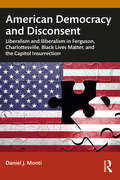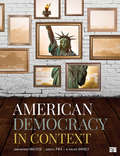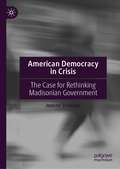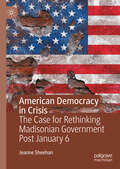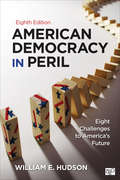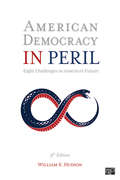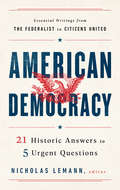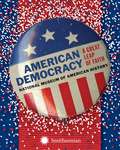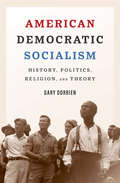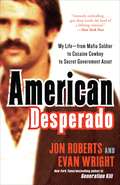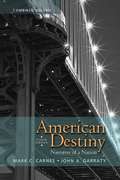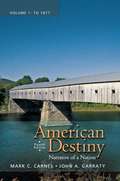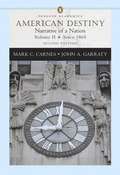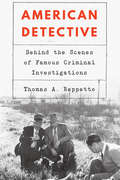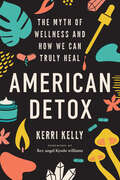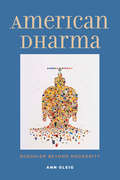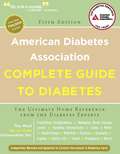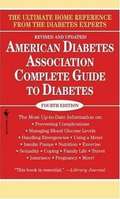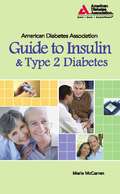- Table View
- List View
American Democracy and Disconsent: Liberalism and Illiberalism in Ferguson, Charlottesville, Black Lives Matter, and the Capitol Insurrection
by Daniel MontiThis volume is a thorough re-examination of civil unrest and discontent in the United States, particularly the intersection of democracy and violence. The work argues that unrest and violence are embedded rituals of social and political "disconsent" and are constitutive features of citizen-based democracy.As such, they are part of how democratic life works: unrest is the eruptive, visible grammar of citizens in a democratic society. Democracy and citizen unrest and violence in the United States are set within a deeper history. The author traces the roots of American democracy – and the rituals of disconsent – to their sources in ancient Mediterranean political society, demonstrating that early democratic theory and practice understood unrest and revolt as morally grounded. Featuring case studies of recent episodes of political and social "disconsent" in the United States, the volume contextualizes the Black Lives Matter protests, unrest around police and institutional violence, and the Capitol insurrection on January 6.Through this, the book provides an important social theoretical lens through which to understand American discontent around racial injustice, political suppression, and citizen disillusionment.
American Democracy in Context
by John Anthony Maltese W. Phillips Shively Joseph A. PikaDiscover what makes American democracy unique and how its government impacts your life American Democracy in Context provides a combined comparative and historical approach to inspire students to better understand American government and become active citizens. Bestselling authors Maltese, Pika, and Shively explain the distinctive features of how Americans practice democracy—how they vote, translate election results into representation of interests, make policy decisions, enforce laws and maintain justice—and how those practices differ from other democracies throughout the world. The emphasis is always on the American political system, but the search for understanding encourages students to examine how the American system has developed over time (historical context) and how it compares with similar practices in other democracies (comparative context). This combined approach motivates students to understand why politics is relevant to their everyday lives and how they can affect changes and make a difference. This title is accompanied by a complete teaching and learning package. Digital Option / Courseware SAGE Vantage is an intuitive digital platform that delivers this text’s content and course materials in a learning experience that offers auto-graded assignments and interactive multimedia tools, all carefully designed to ignite student engagement and drive critical thinking. Built with you and your students in mind, it offers simple course set-up and enables students to better prepare for class. Assignable Video with Assessment Assignable video (available with SAGE Vantage) is tied to learning objectives and curated exclusively for this text to bring concepts to life. LMS Cartridge (formerly known as SAGE Coursepacks): Import this title’s instructor resources into your school’s learning management system (LMS) and save time. Don’t use an LMS? You can still access all of the same online resources for this title via the password-protected Instructor Resource Site.
American Democracy in Context
by John Anthony Maltese W. Phillips Shively Joseph A. PikaDiscover what makes American democracy unique and how its government impacts your life American Democracy in Context provides a combined comparative and historical approach to inspire students to better understand American government and become active citizens. Bestselling authors Maltese, Pika, and Shively explain the distinctive features of how Americans practice democracy—how they vote, translate election results into representation of interests, make policy decisions, enforce laws and maintain justice—and how those practices differ from other democracies throughout the world. The emphasis is always on the American political system, but the search for understanding encourages students to examine how the American system has developed over time (historical context) and how it compares with similar practices in other democracies (comparative context). This combined approach motivates students to understand why politics is relevant to their everyday lives and how they can affect changes and make a difference. This title is accompanied by a complete teaching and learning package. Digital Option / Courseware SAGE Vantage is an intuitive digital platform that delivers this text’s content and course materials in a learning experience that offers auto-graded assignments and interactive multimedia tools, all carefully designed to ignite student engagement and drive critical thinking. Built with you and your students in mind, it offers simple course set-up and enables students to better prepare for class. Assignable Video with Assessment Assignable video (available with SAGE Vantage) is tied to learning objectives and curated exclusively for this text to bring concepts to life. LMS Cartridge (formerly known as SAGE Coursepacks): Import this title’s instructor resources into your school’s learning management system (LMS) and save time. Don’t use an LMS? You can still access all of the same online resources for this title via the password-protected Instructor Resource Site.
American Democracy in Crisis: The Case for Rethinking Madisonian Government
by Jeanne SheehanPublic disenchantment with and distrust of American government is at an all-time high and who can blame them? In the face of widespread challenges—everything from record levels of personal and national debt and the sky high cost of education, to gun violence, racial discrimination, an immigration crisis, overpriced pharmaceuticals, and much more—the government seems paralyzed and unable to act, the most recent example being Covid-19. It’s the deadliest pandemic in over a century. In addition to an unimaginable sick and death toll, it has left more than thirty million Americans unemployed. Despite this, Washington let the first round of supplemental unemployment benefits run out and for more than a month were unable to agree on a bill to help those suffering. This book explains why we are in this situation, why the government is unable to respond to key challenges, and what we can do to right the ship. It requires that readers “upstream,” stop blaming the individuals in office and instead look at the root cause of the problem. The real culprit is the system; it was designed to protect liberty and structured accordingly. As a result, however, it has left us with a government that is not responsive, largely unaccountable, and often ineffective. This is not an accident; it is by design. Changing the way our government operates requires rethinking its primary goal(s) and then restructuring to meet them. To this end, this book offers specific reform proposals to restructure the government and in the process make it more accountable, effective, and responsive.
American Democracy in Crisis: The Case for Rethinking Madisonian Government Post January 6
by Jeanne SheehanThis book analyzes the roots of widespread disenchantment with American government. While blame often falls on the individuals in office, they are not operating in isolation. Rather they are working within a system designed by the Framers with one goal in mind, protectionism. Although the Framers got much right, their commitment to protection of liberty led them to design a system replete with divisions of power. Whatever its merits at the founding, the government today is frequently described as dysfunctional and far too often unresponsive to the majority, unaccountable, and unable to deliver for its people. For those disillusioned with the current state of government and committed to effectuating meaningful change, this book advocates in favor of a fundamental reassessment of the system's primary objectives, followed by deliberation as to how it should be restructured accordingly. It not only presents specific reform proposals, but it ends with a stark warning: until and unless we embrace reasoned structural reform, we cannot be surprised if at some point the people become so frustrated that they either disengage, fight back, or seek solace in autocratic alternatives. This new edition includes audiobook files created by a state of the art text-to-speech tool at the chapter level.
American Democracy in Peril: Eight Challenges to America's Future
by William E. HudsonIn this Eighth Edition of American Democracy in Peril, author William E. Hudson provides a perceptive analysis of the challenges our democracy faces in the current era: economic crisis, partisan gridlock, rising economic inequality, and continued military conflict in the Middle East and elsewhere. By introducing the history of democratic theory in terms of four “models” of democracy, he provides readers with a set of criteria against which to evaluate the challenges discussed later. This provocative book offers a structured, yet critical examination of the American political system, designed to stimulate students to consider how the facts they learn about American politics relate to democratic ideals.
American Democracy in Peril: Eight Challenges to America's Future
by William E. HudsonIn this Eighth Edition of American Democracy in Peril, author William E. Hudson provides a perceptive analysis of the challenges our democracy faces in the current era: economic crisis, partisan gridlock, rising economic inequality, and continued military conflict in the Middle East and elsewhere. By introducing the history of democratic theory in terms of four “models” of democracy, he provides readers with a set of criteria against which to evaluate the challenges discussed later. This provocative book offers a structured, yet critical examination of the American political system, designed to stimulate students to consider how the facts they learn about American politics relate to democratic ideals.
American Democracy in Peril: Eight Challenges to America′s Future (Studies In Political Thinking)
by William E. HudsonAmerican Democracy in Peril encapsulates the tumultuous state of American politics. By introducing the history of democratic theory in terms of four "models" of democracy, Hudson provides readers with a set of criteria against which to evaluate the challenges discussed later. This provocative book offers a structured yet critical examination of the American political system, designed to stimulate students to consider how the facts they learn about American politics relate to democratic ideals. This new edition incorporates the Trump Presidency and the polarization that has accompanied his leadership.
American Democracy in Peril: Eight Challenges to America′s Future (Studies In Political Thinking)
by William E. HudsonAmerican Democracy in Peril encapsulates the tumultuous state of American politics. By introducing the history of democratic theory in terms of four "models" of democracy, Hudson provides readers with a set of criteria against which to evaluate the challenges discussed later. This provocative book offers a structured yet critical examination of the American political system, designed to stimulate students to consider how the facts they learn about American politics relate to democratic ideals. This new edition incorporates the Trump Presidency and the polarization that has accompanied his leadership.
American Democracy in Peril: Seven Challenges to America's Future (3rd edition)
by William E. HudsonThis book expands exploration of what Hudson considers are the major challenges to American democracy: the separation of power; radical individualism; citizen participation; trivialized elections; the privileged position of business; inequality; and the national security system.
American Democracy: 21 Historic Answers to 5 Urgent Questions
From The Federalist to Citizens United, bestselling author Nicholas Lemann presents key writings on five crucial questions confronting American democracy todayAmid the frenzied overload of 24-hour cable news and incessant social media, at a time when many of us fear for the future of our democracy, it is becoming harder and harder to think clearly about politics. American Democracy: 21 Historic Answers to 5 Urgent Questions provides an alternative for those who want to step back and look to the past for inspiration and guidance. Edited with perceptive and provocative commentary by bestselling historian and journalist Nicholas Lemann (The Promised Land, Transaction Man), the book presents key writings from the American past that speak to five contemporary flashpoints in our political landscape: race, gender, immigration, and citizenship; opportunity and inequality; the purpose and powers of the federal government; money, special privilege, and corruption; and protest and civil disobedience. Some of the selections are well-known--George Washington's letter to the Hebrew Congregation at Newport, Frederick Douglass's "What to the Slave is the 4th of July," Martin Luther King Jr.'s letter from Birmingham Jail--while others will be new to many readers--Horace Mann argument for public schools as a means of fighting inequality, Jane Addams's perceptive analysis of gender and social class in charity work, Randolph Bourne envisioning a "Trans-National America." American Democracy presents a remarkable range of insightful and eloquent American political writing, while serving as an invaluable resource for concerned citizens who wish to become better-informed participants in the ongoing drama of our democracy.
American Democracy: A Great Leap of Faith
by Lisa Kathleen Graddy Barbara Clark Smith Harry R. Rubenstein National Museum of American History William BirdAmerican Democracy: A Great Leap of Faith is the companion volume to an exhibition at the Smithsonian National Museum of American History that celebrates the bold and radical experiment to test a wholly new form of government. Democracy is still a work in progress, but it is at the core of our nation's political, economic, and social life. This lavishly illustrated book explores democracy from the Revolution to the present using objects from the museum's collection, such as the portable writing box that Thomas Jefferson used while composing the Declaration of Independence, the inkstand with which Abraham Lincoln drafted the Emancipation Proclamation, Susan B. Anthony's iconic red shawl, and many more. Not only famous voices are presented: like democracy itself, the book and the exhibition preserve the voice of the people by showcasing campaign materials, protest signs, and a host of other items from everyday life that reflect the promises and challenges of American democracy throughout the nation's history.
American Democratic Socialism: History, Politics, Religion, and Theory
by Gary DorrienA sweeping, ambitious history of American democratic socialism from one of the world&’s leading intellectual historians and social ethicists &“Dorrien is supremely qualified for the task he has set himself in this very thoughtful, necessary, and timely book.&”—Maurice Isserman, author of The Other American: The Life of Michael Harrington Democratic socialism is ascending in the United States as a consequence of a widespread recognition that global capitalism works only for a minority and is harming the planet&’s ecology. This history of American democratic socialism from its beginning to the present day interprets the efforts of American socialists to address and transform multiple intersecting sites of injustice and harm. Comprehensive, deeply researched, and highly original, this book offers a luminous synthesis of secular and religious socialisms, detailing both their intellectual and their organizational histories.
American Denim: The Supposed Final Days and Resurgence of a Manufacturing Icon
by Matt SharkeyAmerican Denim aims to preserve a unique property and a unique time in the history of American textiles. At one time the world&’s largest denim mill, occupying more than a million square feet, you almost couldn&’t see where the looms ended at the White Oak mill in Greensboro, North Carolina. Between 1915 and 1970, the lion&’s share of denim produced for Levi Strauss & Co. was made there. Photographer Matt Sharkey was the only person granted access to all three recent stages of the White Oak mill&’s life: • the last week of commercial production in December 2017 • empty and vacated in February 2018 • brought back to life in a small but mighty way in September 2022 Here is a layered history told through beautifully honest "portraits" that were captured with film, an analog process to honor analog manufacturing and those who worked, and work, at the mill.
American Desperado: My Life--From Mafia Soldier to Cocaine Cowboy to Secret Government Asset
by Evan Wright Jon RobertsIn 2008 veteran journalist Evan Wright, acclaimed for his New York Times bestselling book Generation Kill and co-writer of the Emmy-winning HBO series it spawned, began a series of conversations with super-criminal Jon Roberts, star of the fabulously successful documentary Cocaine Cowboys. Those conversations would last three years, during which time Wright came to realize that Roberts was much more than the de-facto “transportation chief” of the Medellin Cartel during the 1980s, much more than a facilitator of a national drug epidemic. As Wright’s tape recorder whirred and Roberts unburdened himself of hundreds of jaw-dropping tales, it became clear that perhaps no one in history had broken so many laws with such willful abandon. Roberts, in fact, seemed to be a prodigy of criminality – but one with a remarkable self-awareness and a fierce desire to protect his son from following the same path. American Desperado is Roberts’ no-holds-barred account of being born into Mafia royalty, witnessing his first murder at the age of seven, becoming a hunter-assassin in Vietnam, returning to New York to become -- at age 22 -- one of the city’s leading nightclub impresarios, then journeying to Miami where in a few short years he would rise to become the Medellin Cartel’s most effective smuggler. But that’s just half the tale. The roster of Roberts’ friends and acquaintances reads like a Who’s Who of the latter half of the 20th century and includes everyone from Jimi Hendrix, Richard Pryor, and O.J. Simpson to Carlo Gambino, Meyer Lansky, and Manuel Noriega. Nothing if not colorful, Roberts surrounded himself with beautiful women, drove his souped-up street car at a top speed of 180 miles per hour, shared his bed with a 200-pound cougar, and employed a 6”6” professional wrestler called “The Thing” as his bodyguard. Ultimately, Roberts became so powerful that he attracted the attention of the Republican Party’s leadership, was wooed by them, and even was co-opted by the CIA for which he carried out its secret agenda. Scrupulously documented and relentlessly propulsive, this collaboration between a bloodhound journalist and one of the most audacious criminals ever is like no other crime book you’ve ever read. Jon Roberts may be the only criminal who changed the course of American history. From the Hardcover edition.
American Destiny: Narrative of a Nation (Combined Volume)
by Mark C. Carnes John A. GarratyWith the political history of the nation as its organizational framework, American Destiny: Narrative of a Nation describes the development and growth of the United States as the product of the myriad actions, ideas, and forces of the immense variety of individuals and groups who together comprise the American people.
American Destiny: Narrative of a Nation (Fourth Edition), Volume 1
by Mark C. Carnes John A. GarratyAmerican Destiny's mission is to show readers how history connects to the experiences and expectations that mark their lives. The authors pursue that mission through a variety of distinctive features, including American Lives essays and Re-Viewing the Past movie essays.
American Destiny: Since 1865 (2nd edition)
by Mark C. Carnes John A. GarratyDrawing on a political historical framework, this text examines the political, social, economic, and cultural developments that have shaped the United States. Carnes (history, Barnard College) and Garraty (history, emeritus, Columbia University) begin the story with the crossing of the Bering Strait and cover events as recent as the attack on the World Trade Center and subsequent "War on Terror." Annotation (c)2003 Book News, Inc., Portland, OR (booknews.com)
American Detective: Behind the Scenes of Famous Criminal Investigations
by Thomas A. ReppettoFrom the Roaring Twenties to the 1970s detectives reigned supreme in police departments across the country. In this tightly woven slice of true crime reportage, Thomas A. Reppetto offers a behind-the-scenes look into some of the most notable investigations to occur during the golden age of the detective in American criminal justice. From William Burns, who during his heyday was known as America’s Sherlock Holmes, to Thad Brown, who probed the notorious Black Dahlia murder in Los Angeles, to Elliott Ness, who cleaned up the Cleveland police but failed to capture the “Mad Butcher” who decapitated at least a dozen victims, American Detective offers an indelible portrait of the famous sleuths and investigators who played a major role in cracking some of the most notorious criminal cases in U.S. history. Along the way Reppetto takes us deep inside the detective bureaus that were once the nerve centers behind crime-fighting on the streets of America’s great cities, including the FBI itself, under the direction of America’s “top cop,” J. Edgar Hoover. According to Reppetto, detectives were once able watchdogs until their role in policing became diluted by patrol strategies ranging from “stop and frisk” to community policing. Reppetto argues against these current policing systems and calls for a return to the primacy of the detective in criminal investigations.
American Detox: The Myth of Wellness and How We Can Truly Heal
by Kerri Kelly&“An intimate, honest, accountable, and thorough invitation into healing&” -- adrienne maree brown, author of Pleasure Activism&“This book is a powerhouse.&” -- Ashley JuddThe myth of wellness is a lie. And until we learn to confront and dismantle its toxic systems, we can&’t ever be well.Better, stronger, healthier, whole--the wellness industry promises us that with enough intention, investment, and positive thinking, we&’ll unlock our best selves and find meaning and purpose in a chaotic and confusing world.The problem? It&’s a lie.The industry soars upwards of $650 billion a year, but we&’re still isolated, insecure, and inequitable. &“Wellness&” isn&’t making us well; it&’s making us worse.It diverts our attention and holds us back from asking the questions that do help us heal: Who gets to be well in America? Who&’s harmed--and who's left out? And what&’s the real-life cost of our obsession with self-improvement?To be truly well, we don&’t need juice fasts or yoga fads. We need to detox from a culture rooted in perfectionism, white supremacy, and individualism--and move toward a model that embodies mutual responsibility and extends beyond self-help to collective care.In American Detox, organizer, yoga activist, wellness disruptor, and CTZNWELL founder Kerri Kelly sounds the wake-up call. It&’s time to commit to the radical work of unlearning the toxic messages we&’ve been fed--to resist, disrupt, and dream better futures of what wellness really means.
American Dharma: Buddhism Beyond Modernity
by Ann GleigThe past couple of decades have witnessed Buddhist communities both continuing the modernization of Buddhism and questioning some of its limitations. In this fascinating portrait of a rapidly changing religious landscape, Ann Gleig illuminates the aspirations and struggles of younger North American Buddhists during a period she identifies as a distinct stage in the assimilation of Buddhism to the West. She observes both the emergence of new innovative forms of deinstitutionalized Buddhism that blur the boundaries between the religious and secular, and a revalorization of traditional elements of Buddhism such as ethics and community that were discarded in the modernization process. Based on extensive ethnographic and textual research, the book ranges from mindfulness debates in the Vipassana network to the sex scandals in American Zen, while exploring issues around racial diversity and social justice, the impact of new technologies, and generational differences between baby boomer, Gen X, and millennial teachers.
American Diabetes Association Complete Guide to Diabetes
by American Diabetes AssociationThe American Diabetes Association-the nation's leading health organization supporting diabetes research, information, and advocacy-has completely revised this comprehensive home reference to provide all the information a person needs to live an active, healthy life with diabetes. Now in its fifth edition, this extensive resource contains information on the best self-care techniques and the latest medical advances. For people with diabetes, this extraordinary guide will answer any question. Topics include the latest on self-care for type 1, type 2, and gestational diabetes; new types of insulin and medications; strategies for avoiding diabetes complications; expanded sections on meal planning and nutrition; and tips on working with the health care system and insurance providers.
American Diabetes Association Complete Guide to Diabetes (3rd Edition)
by American Diabetes AssociationBeginning with the assumption nothing is known about this disease by the reader, the book discusses types of diabetes, treatments, and the value of diet and exercise.
American Diabetes Association Guide to Herbs and Nutritional Supplements
by Laura Shane-McwhorterThe only guide to herbs and supplements for people with diabetes!More and more people are using nutritional supplements and natural remedies for health, but people with diabetes don't always understand how herbs and supplements can affect them. Many supplements can intensify and interfere with prescribed medications for diabetes. The American Diabetes Association Guide to Herbs and Nutritional Supplements lays out, in clear terms, pertinent information about why these popular herbs and nutritional supplements are used and how they affect prescription drugs. Take the guesswork out of taking herbs and supplements with this informative guide.
American Diabetes Association Guide to Insulin and Type 2 Diabetes
by Marie MccarrenUser-friendly guide covers all aspects of insulin use in type 2 diabetesThe American Diabetes Association Guide to Insulin & Type 2 Diabetes addresses common fears about insulin therapy and what is involved with beginning to use insulin. Additional chapters discuss fine-tuning of insulin self-management, gadgets to make life easier, and troubleshooting steps to overcome any problems readers may have.
